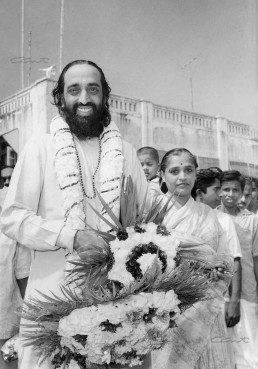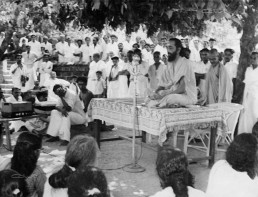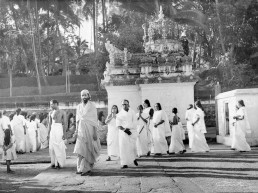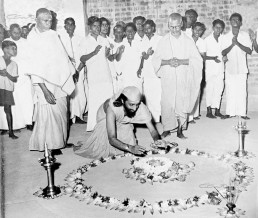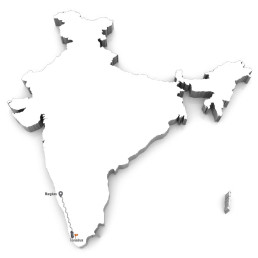
Jnana Yajna 48

Year & Dates:
November 13, 1958 to December 03, 1958

Yajna Topic:
Shrimad Bhagavad Gita- Chapter 3

Place:
Thiruvananthapuram (Trivandrum), India.
Bhagavan’s Divine Song was going to flow again through the Chinmaya Flute, and the biggest pandal in Thiruvananthapuram with a capacity of 8000 to 10000 awaited its mellifluous inauguration in the 48th Jnana Yajna on November 13, 1958 by Her Highness Maharani Sethu Parvathi Bai of Travancore. After her words on the need for resurgence of ancient Vedic wisdom, Pujya Gurudev opened His discourse with an optimistic note. While the western world had done much to raise the standard of living, He said, the sages of India delved deeper to elevate the standard of life. Despite the Atomic Age and decades of colonial rule, India was waking up to relook at Her culture, and “revival of Vedanta was the revival of the nation.”
Raising the Standard of Life
The melody of Srimad Bhagavad Gita’s chapter 3 drew more each evening as Pujya Gurudev instructed how to sublimate self-centered actions into Karma Yoga, the path of action without attachment. Focusing on Bhagavan Krishna’s description of how the entire world turns on the wheels of action, He highlighted the importance of doing one’s bounden duty, egoless, and with devotion.
After a powerful Akhanda kirtan and Gita Havan, Pujya Gurudev planned for the devotees of Trivandrum a memorable Avabhrta Snaana in the Thamirabarani river flowing through Tirunelveli In Tamil Nadu. The yatra at the end of the Jnana Yajna was not just a spiritual picnic; the attitude of traveling in satsang, bhajans, and constant remembrance of the divine presence in everything transformed the pilgrims’ perspective. The sacred dip in the waters was not just energizing but also sanctifying. When Pujya Gurudev led them to the ancient Nellaiappar Temple where Bhagavan Shiva had performed penance and His Cosmic Dance, where Bhagavan Vishnu as Nellai Govinda blessed and solemnized the divine wedding of Bhagavan Shiva with Kantimathi (Goddess Parvati), the importance of worship was experienced. The astonishing craftsmanship of the famous musical pillars in the Mani Mandapa, the Taamra (copper) Hall of Dance with its intricate woodwork, and the shrines of various Gods inside the sprawling temple reminded people of the land’s sacred heritage. Pujya Gurudev also took them to Cape Comorin for another unforgettable darshan of Devi Kanyakumari before the huge group returned to Trivandrum bathed in a bliss they had failed to recognize before.
Pujya Gurudev, bringing out the warbling wisdom of the melodic Gita in His 48th Jnana Yajna, appealed to the devoted audience to infuse their lives with noble values. That would lead to an inspired standard of life rather than just an externally prosperous standard of living.
Photo Gallery
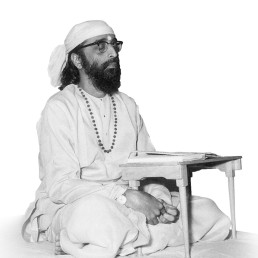
“Think,” Says Pujya Gurudev
Karma Yoga is a way of life, and we have to live it if we want to come under its grace.
The Path-of-work lies through a process of elimination of the desires in us. When egoism and ego-centric desires are eliminated the work accomplished through such an individual is the true divine action, which is destined to have enduring achievements. To the extent man is not practicing this efficient Way-of-Work, he should grow necessarily unintelligent, and to that extent his discriminative capacity should be found deteriorating and ultimately destroyed.
From Yajna Prasad
Stop this Now!
What can ancient wisdom teach us about the importance of mutual cherishing between humanity and nature? Can we extract valuable lessons from humanity’s transition from arrogance to harmony in our interaction with the environment? Let’s delve into the potential of cooperation to drive transformative change towards a sustainable future for all beings.
